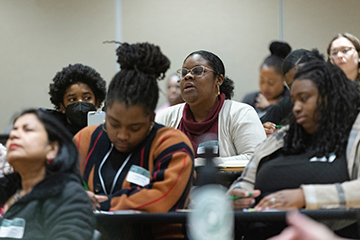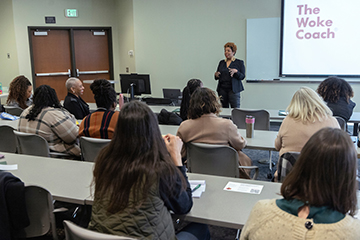Binghamton University hosts inaugural DEI Symposium
The first annual Principles of Community DEI Symposium gathered national and campus higher education professionals, highlighting the importance of diversity, equity and inclusion efforts

Binghamton University held its inaugural Principles of Community DEI Symposium, which gathered leaders and practitioners in diversity and inclusion from higher education and beyond, on Nov. 13.
“Given the recent pushback against DEI initiatives in higher education, we felt this was an ideal time to reaffirm our commitment to this work,” said Karen Jones, vice president of the Division of Diversity, Equity and Inclusion and a symposium committee member. “By bringing together thought leaders in the field, we wanted to provide an enriching learning experience for campus community members and our neighboring community partners. We hope that attendees can apply what they learned in their everyday work.”
The idea for the symposium originated from a three-way conversation between Jones; Anne Saint Juste, housing and business coordinator in Student Affairs; and Carmen Jones, assistant dean for diversity in the Thomas J. Watson College of Engineering and Applied Science. Saint Juste and Carmen Jones serve as divisional diversity officers for their respective campus offices; from the monthly virtual diversity officer meetings, the idea for a special in-person session began to take shape.
“What initially started as an idea for an in-person session for the University’s divisional officers evolved into a full-day conference after several discussions with Carmen and Dr. Karen Jones,” Saint Juste said. “Once the committee came together, we developed a full-day itinerary featuring speakers that included both national experts and those from our campus.”
The inaugural symposium was a free, full-day event open to staff and faculty from Binghamton University and SUNY Broome Community College. More than 80 attendees signed up, including Mikayla Short, a disability services specialist in the Office of Services for Students with Disabilities.
“I first learned about the symposium through Dateline and thought it would be informative, as disability is a significant aspect of DEI,” Short said. “This was the first time I heard about the ‘B’ in DEIB, which stands for belonging. It highlighted how important it is to feel connected with the people you work with and advocate for. I also came away with the understanding that everyone has some leadership aspect in their role.”
The symposium featured break-out workshop sessions, with presenters including Binghamton University staff Jen Smith, coordinator of restorative practices at UDiversity Educational Institute, and Alison Twang, the director of the Center for Community and Civic Engagement. National speakers included Ronald Milon, executive director of diversity and culture at Nederlander Production Company of America, and Seena Hodges, The Woke Coach®. Clyde Wilson Pickett, vice chancellor of equity, diversity and inclusion at the University of Pittsburgh and National Association of Diversity Officers in Higher Education (NADOHE) chair, delivered the keynote address.
’You can’t have inclusion without diversity.’
Milon’s presentation centered on inclusive leadership. He addressed some of the current challenges and issues in higher education, including declining enrollment, an increasing lack of trust in educational institutions, conflicts on campus around free speech, the impact of real-world events and even technology and AI. He explained that inclusive leaders succeed through principles of growth and empathy and by fostering an environment “where everyone feels valued and inspired to contribute their best.”
Milon spoke about the value of education in ensuring a diverse democratic society and that diversity is the cornerstone for creating an inclusive and equitable community.
“We must recognize that when we nurture diverse voices and perspectives,” Milon said, “we not only empower individuals but also elevate the entire organization.”
The margins of history
Pickett delivered the midday keynote address, a call to action to continue the work of those who came before.
“Each individual is here because of the investment of others,” said Pickett, citing his grandfather, William, as an example of an “ordinary” person who profoundly influenced those around him and succeeding generations. However, as Wilson noted, the legacies of these “everyday” individuals are often found only in the “margins” of our collective history.
Pickett also urged a pushback against rhetoric suggesting that DEI work is divisive, arguing that diversity, equity and inclusion are essential components of ensuring fairness and justice for all. The interconnectedness of humanity demands a level playing field: “None of us is truly free until all of us are free remains a central component of the work to champion diversity, equity and inclusion,” Pickett said.
From ally to accomplice
Hodges, also known as The Woke Coach®, emphasized the importance of emotional engagement and inclusion in addressing racial equity and injustice and discussed the origins and evolution of the term “woke,” tracing it back to the 1860s. She founded her company in 2018 to help individuals navigate issues of racism, bias and injustice, aiming to empower them to take action.
Hodges’s talk explained the journey from ally to accomplice; while allyship may involve well-intentioned behavior, being an ally is not enough, she said.
“Accompliceship is about being proactive,” Hodges said. “It involves intentional actions and a sense of personal responsibility to address the historical impacts on the current realities faced by historically excluded groups.”
She emphasized that being an effective accomplice requires individuals to take action, educate themselves, and be willing to use (and risk) their power and privilege to benefit others.
Organizer Carmen Jones notes that there will be plans to move forward with this as an annual event.
“I was looking for a way to connect with other divisional diversity officers, and I was interested in being in the same room with other people who thought about diversity issues in similar ways,” she said. “I think the symposium filled a need for myself and other members of the campus community.”
If you missed the conference, you can still participate in Jen Smith’s Restorative Practices 101 workshop, which takes place regularly throughout the year (or can be requested by a campus department or office). The next open session for Smith’s restorative practices workshop will take place virtually at 6:30 p.m. Nov. 19.
Faculty and staff may also attend UDiversity Educational Institute’s final inclusive pedagogy session for the fall semester: “Integrating Civil Dialogue in the Classroom,” led by Alison Twang and Barry Brenton, faculty engagement associate. Participants will review the role of dialogue in student learning, models of dialogue practices and effective facilitation skills. Teaching assistants, junior and senior faculty, administrators and professional staff are invited to join the conversation from noon to 1:30 p.m. Monday, Nov. 25, in UUW 324. Lunch will be provided, and registration is required.
For more information about these and other UDiversity workshops, contact deiudiv@binghamton.edu.



